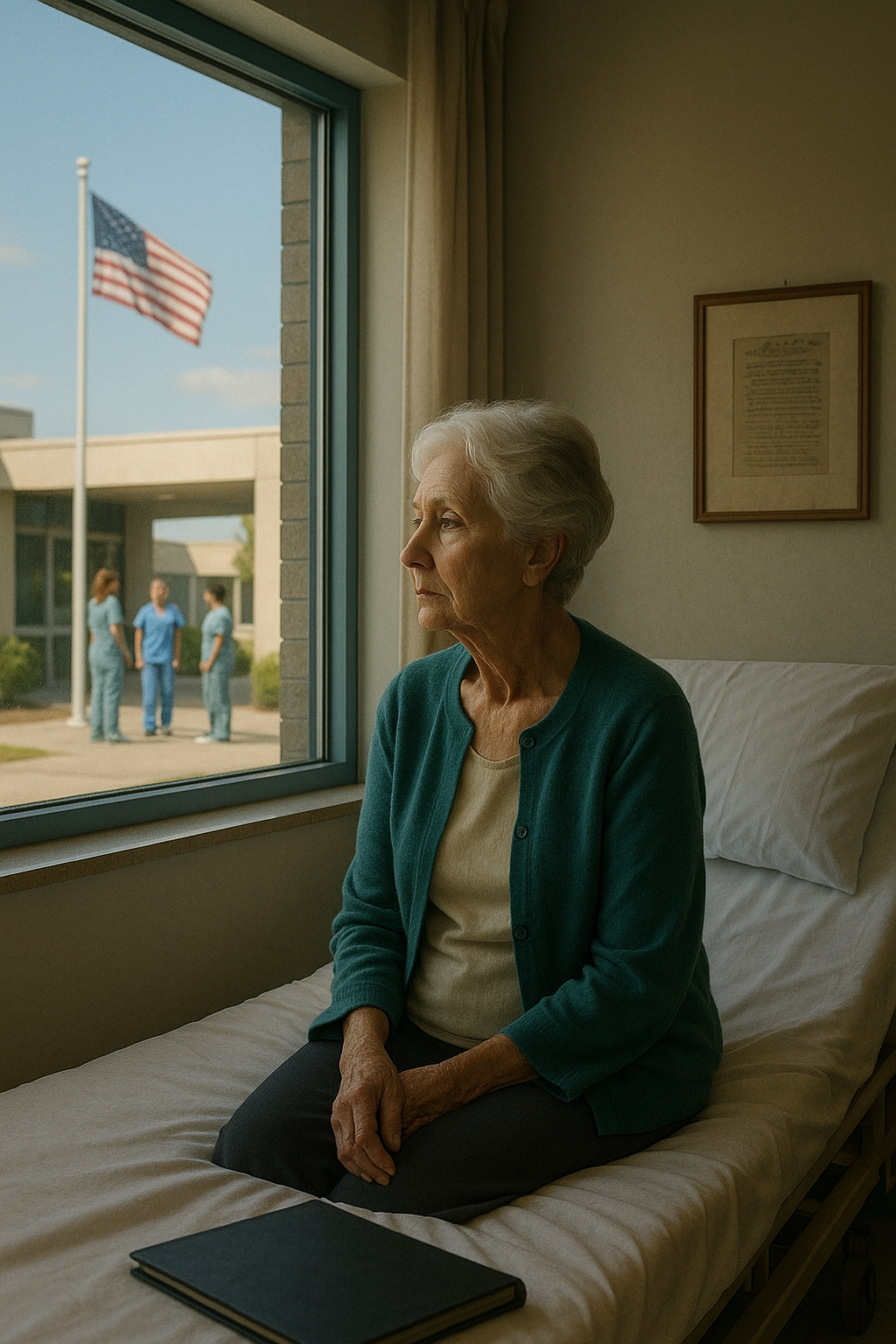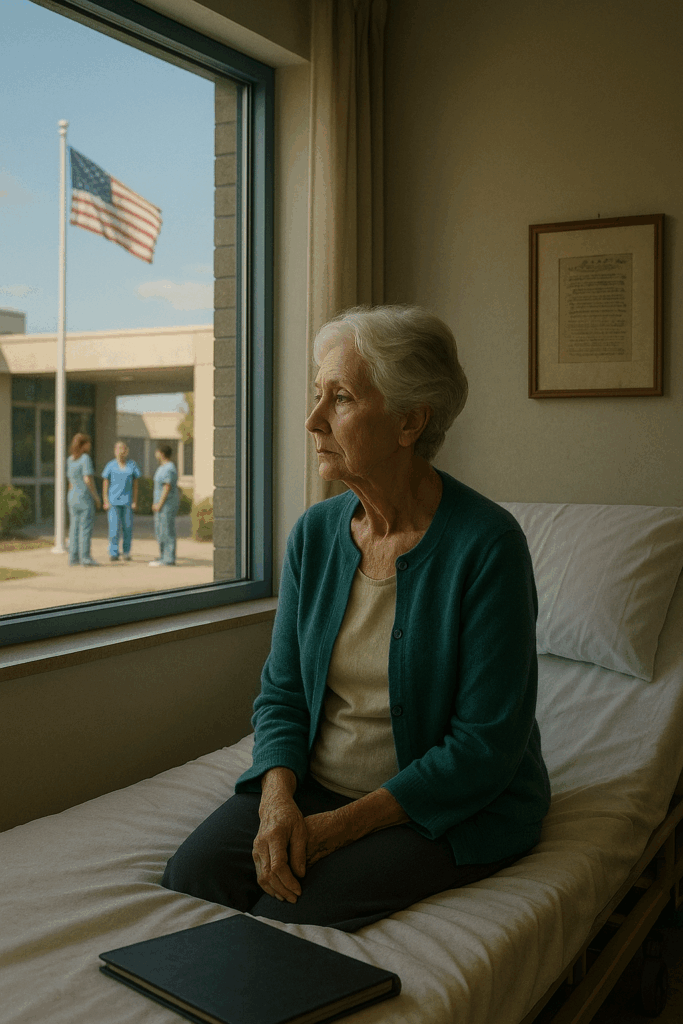🕯️ We Said It Was ‘Best for Mom.’ A Month Later, She Owned the Nursing Home — And One Sentence in Her Will Destroyed Everything I Thought I Knew About Love.
They called it “best for Mom.” I said it first. My sister nodded. My wife squeezed my hand. And that’s how we justified leaving our mother in a building that smelled faintly of lemon cleaner and endings.
She smiled at us the whole time. That was the worst part. Not the smile itself, but the way it didn’t reach her eyes — those calm gray eyes that used to see right through me when I was a boy sneaking change from her purse. We told ourselves it was for her own good. We told ourselves a lot of things.
The Day We Left Her
Her name was Margaret Holloway, and she had once been the fiercest woman I knew. A waitress, a widow, a survivor of the kind of poverty that doesn’t just empty your pockets — it eats at your dignity. But age has a cruel way of softening the edges it once sharpened. She’d fallen twice that year. Forgot the kettle on. Left the oven burning overnight.
The doctor said she’d be safer in care. So we brought her to Maplewood Residence, a place the brochures called “Luxury Assisted Living for Independent Seniors.” It had flowers in the lobby and soft music on repeat — the kind of environment that looks gentle until you realize it’s designed to be forgettable.
When I hugged her goodbye, she said, “Take care of yourself, Aaron.” Not I’ll be fine. Not Come visit soon. Just that. Like she already knew something I didn’t.

The Silence
The first week, I texted her every day. She replied with short, polite messages. Food’s fine. Staff is kind. Don’t worry. The second week, the replies stopped. When I called, the nurse said she was “resting.” When I dropped by, she was “in a group activity.” Always busy. Always somewhere else.
My wife said, “She’s adjusting. Give her time.” So I did. And time, as it turns out, was the one thing she used better than anyone. Unbeknownst to me, while I was convincing myself I’d done the right thing, my mother was plotting. She’d always been sharper than I gave her credit for. Even after her memory slips, she could still recall every detail that mattered.
What I didn’t know was that two weeks before we placed her in Maplewood, she’d walked into a law office downtown and met with an attorney named Clara Jensen. Clara would later tell me, in a voice that carried both admiration and fear,
“Your mother didn’t come here to write a will. She came to build an empire.”
A month after she’d moved in, everything changed. I woke up one morning to see her face on the local news.
The headline: “Elderly Woman Buys Nursing Home After Family Places Her There.”
At first, I thought it was satire. Some social media hoax. But there she was — hair neat, lipstick perfect, standing at the entrance of Maplewood with a microphone in her hand, announcing new management.
“We’re making a few changes,” she said, her voice calm and unshakable. “Starting with the policy that allows families to abandon loved ones without their consent. That ends today.”
My phone rang every five seconds that morning — my sister, my wife, reporters. But all I could do was stare at the TV and feel something I hadn’t felt in years.
Pride. And shame. Both at once.
When I finally went to see her, the front gate had new signs. No corporate logos. No “Visitors Must Check In.” Just a bronze plaque that read: Holloway House — A Home, Not a Holding Pen.
The staff looked different too. Happier. Unafraid. When I walked into her office — her office — she didn’t look surprised. She just smiled that same small smile she’d given me the day I left her there.
“Hello, Aaron,” she said.
“Mom,” I whispered. “What… what have you done?”
She gestured around. “I bought it.”
I laughed, because the alternative was to break down right there. “You bought the nursing home?”
She nodded. “Not just this one. I’m acquiring two more.” “Why?” I asked. “To prove a point?”
Her eyes softened. “To fix what’s broken.”
We sat in silence for a while. The hum of a nearby aquarium filled the space between us. “Mom,” I finally said, “why didn’t you tell me?”
“Would you have believed me?” she asked quietly.
And I realized — no, I wouldn’t have. Not the woman I’d decided was “losing it.” Not the mother I’d neatly labeled as fragile because it made me feel less guilty.
“I never wanted to embarrass you, Aaron,” she continued.
“But you and your sister made a choice. You called it best for Mom. So I made one, too. I called it best for everyone else.”
Her Revenge Was Mercy
Under her ownership, Maplewood transformed. Residents who’d been forgotten by their families found purpose again — volunteering at local schools, mentoring kids, planting gardens. She hired staff who had once been dismissed for caring too much. Opened free counseling sessions for families who wanted to rebuild ties.
And every night at dinner, she sat at the same table with everyone — no title, no privilege. But she also made one quiet, brutal change.
She removed the visitation privilege for any family that had signed involuntary placement papers. That included me. The first time I was turned away at the door, I understood what exile felt like.
Two years later, she died peacefully in her sleep. The funeral was small — her choice. She’d requested no flowers, no speeches, no hymns. Just one line printed on the back of the program:
“Don’t blame me. You called it best for Mom.”
A week after the funeral, I was summoned to the same law office where it all began. The attorney, Clara, sat behind her desk with a sealed envelope and a faint, knowing smile. “She wanted me to give this to you personally,” she said. I took it, hands trembling. Inside was a single sheet of paper — handwritten in her looping cursive.
“My dearest Aaron,
I forgave you the moment you turned the car around that day. But forgiveness does not erase consequence. You once said you couldn’t take care of me anymore. So I made sure you’d never have to. Maplewood — now Holloway House — will be owned in trust by its residents. Every nurse, every cook, every forgotten soul will hold a piece of what once held them captive.
To you, my son, I leave one gift: understanding.
I hope someday you realize that I didn’t buy freedom for revenge.
I bought it so you could see what love looks like when it refuses to die quietly.
Don’t blame me.
— Mom”
The Hidden Line
At the bottom of the will was a typed addendum, signed by both my mother and her lawyer. “Any family member who knowingly places a relative in care against their will forfeits inheritance rights and financial claim. However, they may volunteer freely, without compensation, if they seek redemption.” There it was — her final sentence. The one that broke me. The one that changed everything.
Six months later, I went back to Holloway House. Not as a son. As a volunteer. They gave me the morning shift in the garden — pruning roses, watering herbs, planting new seeds. The same garden she’d once tended herself. Every day I showed up, quietly, without announcement. I met the residents. Listened to their stories. Wrote down their dreams. And in that garden, I started to understand what she’d meant.
One morning, I found an old notebook in her office drawer. Inside were pages filled with names and short phrases: Martha — two jobs, tired eyes, dreams of teaching. Mr. Lee — WWII vet, still hums Sinatra. Grace — wears lipstick every morning “just in case.” And at the bottom of one page, underlined twice: If I ever get the power, the waiting will end. It hit me then — this wasn’t revenge. It was a revolution.
She hadn’t bought the home to punish her children. She’d bought it to give dignity back to the forgotten.
The New Beginning
Today, I still work there. Not for a paycheck — for peace. The residents know me as “Aaron, the gardener.”
Most don’t even know I’m the son of the woman who built this place. And that’s fine with me.
Sometimes, I’ll catch sight of her old portrait hanging in the lobby — eyes bright, half-smile daring the world to underestimate her again. And I swear I can almost hear her voice: “See, Aaron? Every ending really is a new beginning.”
It’s been three years now. The garden is blooming. Families visit more often. The air doesn’t smell like endings anymore. But every so often, when I see a new resident arrive — scared, betrayed, holding a bag with their name written in Sharpie — I feel that old ache again.
Because I wonder:
If love can rebuild what guilt destroyed, why do we wait until it’s too late to remember how to love in the first place?


